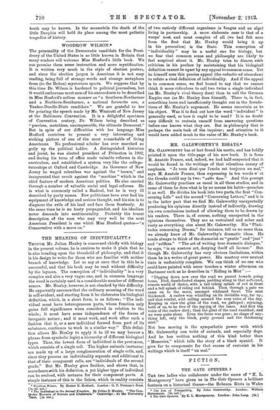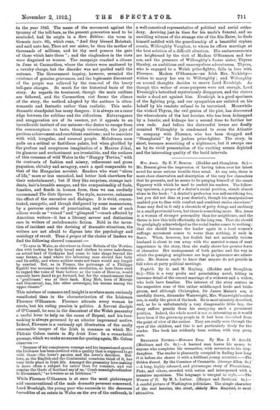FICTIO N.
THE GATE OPENERS. t THE two ladies who collaborate under the name of " L. Montgomery" have given us in The Gate Openers a brilliant fantasia on a historical theme—the Rebecca Riots in Wales • 1he Ins of Trattopultitg. By John Gaiswortiiy. London; William
Heinemann. [6s. net."
t The Gate Openers. By S. L. Montgomery. London: John Long. [Ss.] sin the year 1843..; The name of -.the movement against the tyranny of the toll;ba.ra,aa the present generation need to be ieminded, had its origin. in .a ors Biblica: the verse in
'Genesis (xxiv. 6Q),- which runs, " And they blessed Rebekah, and said unto her, Thou art our sister, be thou the mother of thousands of millions, and let thy seed possess the gate of those which hate them "; and the ringleaders in the riots were disguised as women. The • campaign reached- a climax
in June at Carmarthen, where- the rioters were scattered by -a cavalry charge,. but the disorder was not-quelled until the autumn. The -Government inquiry, • however, revealed the -existence of genuine grievances, and the legitimate discontent of the people was relieved by the removal of the heavy toll.gate. charges. -So much for the historical basis of the story. -As regards its treatment, though the. main outlines
are . followed, and the Carmarthen riot forms the climax -of the story, the method adopted by the authors is ultra- fomantic and fantastic rather than realistic. This melo- -dramatic standpoint has many dangers : it is always on a razor -edge between the sublime and the ridiculous. Extravagance
and exaggeration are .of. its essence, yet it appeals to an ineradicable instinct of our natures—the desire to escape from the commonplace: to taste, though vicariously, the joys of perilous achievement and exorbitant emotions ; and to associate with wild, irregular, and unusual people. Melodrama soon palls on a-critical or fastidious palate, but when glorified by the profuse and sumptuous imagination of a Maurus Jokai, its, glamour and enchantment are irresistible, and the authors
of this romance Of -wild Wales in the "Hungry 'Forties," with its dontrasts of fashion and misery, refinement and gross oaganism, chivalry and savagery, exert a-spell comparable to that of the. Hungarian novelist. Readers who want " slices of life," more or less uncooked, had better look elsewhere for their entertainment ; but if they like surprises, strange inci- dents, hair's-breadth-eseapes, and the companionship of fools,
fanatics, and' fiends .in . human form, then we can cordially recommend The Gate Openers. The style, moreover, enhances the effect of the ;narrative and dialogue. ' It is vivid, concen-
trated, energetic,, and though disfigured by some mannerisms, by a perverse system of punctuation, and the use of such odious words as " voiced " and "glimpsed "—much affected by American writers—it has a .literary . savour and distinction
rare in writers -of melodramatic fiction. Bold in, the inven- tion Of incident and the devising of dramatic situations, the Writers are not afraid to digress into the psychology . and
sociology of revolt. Thus apropos of the choice of leaders we find the following shreWd comment :-
" To eyes in Wales, as elsewhere in Great Britain of the 'Forties, dim with looking for daily bread--and clothes to cover nakedness, an actual land of Cockayne had come to take shape' beyond the near future, a land where the labouring man should fare fatly and lie-softly, and where neither rents nor taxes would any longer be exacted. But, as in France, the patronage of a Philippe iggalite Was necessary to embolden revolution, so. here those used to regard the voice of their betters as the voice of Heaven, would scarcely have dared-to-go. forward; but- for the consciousness that a 'gentleman' was at their back. King- Mob, born of. Misrule and Discontent,. has, like other sovereigns; his -nurses• among the upper -Classes."
This mixture of romance end ineightis nowheremore curiously manifested than in the characterization of the Irishman Florence'O'Shannon. Florence attracts every woman he Meets,-but--his ruling passion-is-politics. 'A fervent disciple of O'Connell, he sees in the discontent of-the:Welsh -peasantry a useful lever to`le.lp 'on .the oause of'Repeal, and hie-love- making iwalwaya governed by an ulterior impersonal motive.
Indeed, Florence is a enriously apt -illustration -of the - coolly reasonable 'temper -of .the Irish in romance on which Mr. Padraic Colum insists in -My _Trish Year. In.a. remarkable
passage, Which we make no exense.for quotingagain,-Mr. Colum observes
"Because of his -conspicuous courage and his impassioned speech the Irishman has been credited with a quality that is supposed to go with thesethe lever's, passion and the .lover's devotion. Bat love, as the English and the Continental countries think -of it, has very little place in Irish life. Amongst.the-peasantry love-making is more often a subject for satire than for romance, and our ceusins the Gaels of Scotland,sayef 11B, Coinhneamlighradlzmhar le Eireannach,"-as-loveless as 'an Irishman."
While Florence 0!Shannon is at once the .most- pictUresque
and unconventional of the -male dramatis personae concerned, Lord 'Evesleigh, the young peer who succeeds to the danmosa haer-editas of an estatein"Wiles on-the eve-of the-outbreak-Os. a well-conceived representative of political and social ortho- doxy. Arriving just in time ?for his -uncle's funeral, and. an unwilling witness of the strange rite of the Sin-Eater, he finds himself saddled-with the, guardianehip of beautiful orphan cousin, Willoughby Vaughan, to whom he offers marriage as the best solution of a difficult situation. His embarrassments are heightened by the visit of Madam O'Shannon and her son, and the presence of Willoughby's foster sister, Thyme Stanley, an ambitious and unscrupulous adventuress. Tbyrza, who is engaged to a Welsh prize-fighter, falls in love with Florence. Madain O'Shattnon--an Irish Mrs. Nickleby:— wishes to marry her son to Willoughby ; and Willoughby, on second thoughts decides to marry Lord Evesleigh. As though this welter of cross-purposes were not enough, Lord Evesleigh's betrothed mysteriously disappears, and the rioters make a dead set against him. Evesleigh is a good specimen of the fighting prig, and our sympathies are enlisted on his behalf by his resolute refusal to be terrorized. Meanwhile the-wicked Thyrza, the evil genius of the plot, has discovered the whereabouts of the lost heroine, who has been kidnapped by a lunatic, and kidnaps her a second time to further her own ends. And before the distressful lovers are finally reunited Willoughby is condemned to cross the Atlantic in company with Florence, who has been drugged and "Shanghaied" by the jealous prize-fighter. The story, in short, becomes something of a nightmare, but it sweeps one en by its vivid- presentation of the exciting scenes depicted and the interesting quality of -the lucid intervals.



























































 Previous page
Previous page